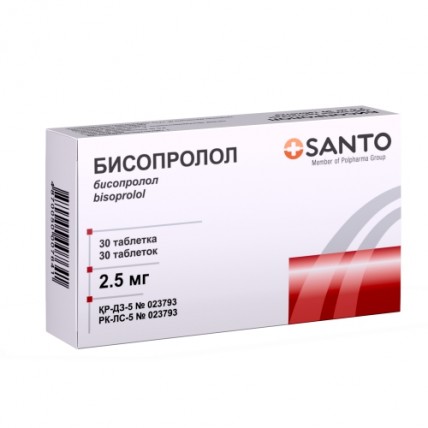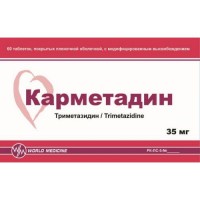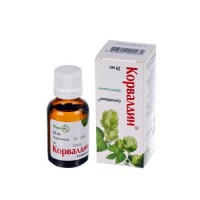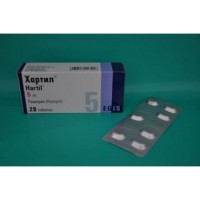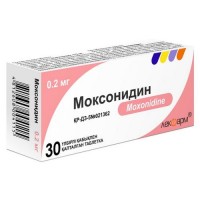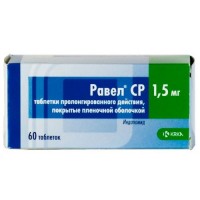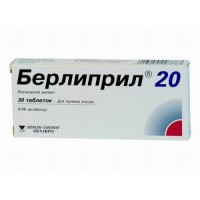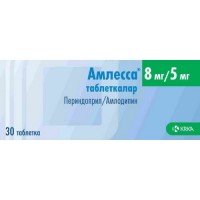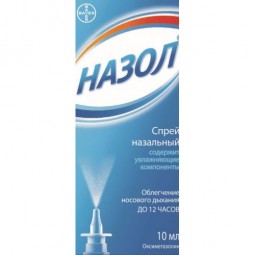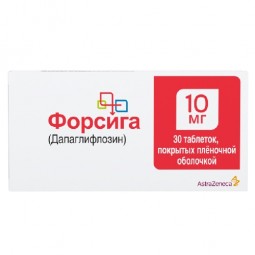Bisoprolol 30s 2.5 mg coated tablets
- $4.80
The instruction for medical use of Bisoprolol Torgovoye medicine a name Bisoprolol Mezhdunarodnoye the unlicensed name Bisoprolol Lekarstvennaya the Tablet form, coated 2.5 mg, 5 mg and 10 mg Structure One tablet contains active agent – the bisoprolola fumarates 2.5 mg, 5 mg and 10 mg excipients: microcrystalline, silikatizirovanny cellulose (PROSOLV® EASYtab SP), sodium of a kroskarmelloz, sodium of starch glikolit type A, magnesium stearate, Structure of a cover: opadray white **, opadray yellow ***, opadray pink **** structure ** a gipromelloza, the titan dioxide (E171), a polyethyleneglycol/macrogoal *** polyvinyl alcohol, the titan dioxide (E171), a polyethyleneglycol/macrogoal, talc, vanillin, yellow quinolinic aluminum varnish (E104) **** a gipromelloza, the titan dioxide (E171), lactose monohydrate, a polyethyleneglycol/macrogoal, triacetin, iron oxide yellow (E172), iron oxide red (E172), iron oxide black (E172) the Description of the Tablet round, with a biconvex surface, coated white or almost white color (for a dosage of 2.5 mg). Round tablets, with a biconvex surface, coated from light yellow till yellow color (for a dosage of 5 mg). Oval tablets, with a biconvex surface, on one party of risk, coated from light pink till pink color (for a dosage of 10 mg). Pharmacotherapeutic group Cardiovascular system. Beta blockers. Selection beta blockers. Bisoprolol. The ATX C07AB07 code the Pharmacological Pharmacokinetics Later properties of oral administration bioavailability of a bisoprolol makes 90%. Distribution volume − 3.5 l/kg. Linking with proteins of blood plasma reaches about 30%. Bisoprolol is brought from an organism in two ways. About 50% are metabolized in a liver with formation of inactive metabolites which then are allocated with kidneys. Other 50% are removed with urine in not changed look. The general clearance is about 15 l/hour. The plasma elimination half-life of blood making 10-12 hours provides 24-hour effect after use of a dose once a day. The kinetics of a bisoprolol linear also does not depend on age. Special groups of patients the Pharmacokinetics at patients with the stable chronic heart failure (CHF) and impaired renal function or a liver was not studied. At patients with chronic heart failure (functional class III on classification of the New York association of heart (NYHA)) concentration of a bisoprolol in blood plasma and elimination half-life is more in comparison with indicators at healthy volunteers. The pharmacodynamics Active ingredient of the drug Bisoprolol, is high-selection β1-адреноблокатор, without own sympathomimetic activity, not possessing clinically significant membrane stabilizing action. Bisoprolol has low affinity to β2-рецепторам smooth muscles of bronchial tubes and vessels and also to β2-рецепторам, belonging to regulation of a metabolism. Therefore, bisoprolol in general does not cause resistance of airways and β2-опосредованных metabolic effects. Selective effect of drug on β1-рецепторы extends for a framework of a therapeutic dose. Indications - arterial hypertension - coronary heart disease (stable stenocardia) - treatment of stable chronic heart failure with reduced systolic function of a left ventricle, in addition to inhibitors of angiotensin-converting enzyme (iAPF), diuretics and optionally cardiac glycosides the Route of administration and doses it is necessary to take the Drug Bisoprolol in the morning regardless of meal. Tablets should be washed down with a small amount of liquid. Tablets should not be chewed. Treatment of arterial hypertension and coronary heart disease (stable stenocardia) the Recommended dose of a bisoprolol for both indications makes 5 mg once a day. If necessary it is possible to increase a dosage to 10 mg once a day. The Maksialny recommended Bisoprolol's dose makes 20 mg once a day. The dosage of drug has to be selected individually, depending on the clinical answer and an indicator of the heart rate (HR). Therapy by the drug Bisoprolol usually is long. Do not interrupt sharply treatment and do not change the recommended dose without consultation with your doctor as it can lead to temporary aggravation of symptoms. Especially it is not necessary to interrupt suddenly therapy at patients with coronary heart disease. If suspension of treatment is necessary, the dose has to decrease gradually (within 1-2 weeks). Treatment of chronic stable heart failure (HSN) Standard treatment of HSN consists of iAPF (or, in case of intolerance of iAPF, a blocker of receptors of angiotensin), a beta-blocker, diuretics, and in case of need cardiac glycosides. At treatment initiation bisoprololy the condition of patients has to be stable (without acute heart failure). It is desirable that the attending physician had experience of treatment of patients with HSN. Emergence of passing deterioration in symptoms of heart failure, hypotension, bradycardia during titration of a dose or after it is possible. A dose the Initiation of treatment of persistent chronic heart failure the drug Bisoprolol demands obligatory carrying out a special phase of titration. Treatment of chronic heart failure the drug Bisoprolol begins according to the following scheme of gradual titration of a dose. The dose can be increased only in case the previous dose was well transferred. 1 week of 1.25 mg of a bisoprolol of the fumarat daily once a day the 2nd week of 2.5 mg of a bisoprolol of the fumarat daily once a day the 3rd week of 3.75 mg of a bisoprolol of the fumarat daily once a day 4-7 week of 5 mg of a bisoprolol of the fumarat daily once a day * 8-11 week of 7.5 mg of a bisoprolol of the fumarat daily once a day * the 12th week and after 10 mg of a bisoprolol of the fumarat daily once a day as maintenance therapy * * Bisoprolol of 2.5 mg is suitable for initial treatment of stable chronic heart failure. Higher dosages are suitable for maintenance therapy. The maximum recommended dose of a bisoprolol of the fumarat makes 10 mg once a day. Individual adaptation depending on that can be required, how well the patient transfers the appointed dose. During a phase of titration and after it temporary deterioration in heart failure, hypotension or bradycardia can be observed therefore careful observation of vital signs (arterial blood pressure, ChSS) and symptoms of progressing of heart failure is required. Symptoms can appear in the first day of treatment. Treatment modification If the maximum dose is badly transferred by the patient, revision of a dosage towards gradual decrease is recommended. If temporary deterioration in heart failure is observed, hypotension or bradycardia develops, revision of a dosage of the accompanying drug is recommended. Also temporary decrease in a dosage of a bisoprolol or suspension of treatment can be required. Continuation of treatment and/or repeated titration should be carried out after stabilization of a condition of the patient. If it is necessary to suspend treatment, the dose has to decrease gradually (within 1-2 weeks) as the sharp termination of therapy can cause aggravation of symptoms of heart of the patient. Therapy of chronic stable heart failure the drug Bisoprolol usually is long. Special groups of patients the Renal failure or a liver or kidneys of easy or moderately severe correction of the mode of dosing, as a rule, are not required to Patients with abnormal liver functions. For patients with heavy renal failures (clearance of creatinine & lt, 20 ml/min.) and patients with heavy abnormal liver functions the maximum daily dose makes 10 mg. There is only a limited experience of use of a bisoprolol at patients on dialysis which does not indicate the need to correction of the mode of dosing. Elderly patients: Dose adjustment is not required. Patients of children's age there Is no information on use of a bisoprolol for patients of children's age. Use of a bisoprolol for children is not recommended. Side effects the Frequency of side effects of drug is defined as follows: very often (≥ 1/10), it is frequent (≥ 1/100, & lt, 1/10), infrequently (≥ 1/1000, & lt, 1/100), is rare (≥ 1/10,000, & lt, 1/1000), is very rare (& lt, 1/10,000), frequency is unknown (it cannot be established on the basis of the available data). Disturbances from mentality: Infrequently: sleep disorder, depression. Seldom: nightmares, hallucinations. Disturbances from nervous system: Often: dizziness *, head bol*. Seldom: syncope. Disturbances from organs of sight: Seldom: decrease in a slezootdeleniye (that should be considered at use of contact lenses). Very seldom: conjunctivitis. Disturbances from an organ of hearing and balance: Seldom: hearing disorder. Disturbances from heart: Very often: bradycardia (at patients with chronic heart failure). Often: aggravation of symptoms of heart failure (at patients with chronic heart failure). Infrequently: disturbances of atrioventricular conductivity, bradycardia (at patients with hypertensia and stenocardia), aggravation of symptoms of heart failure (at patients with hypertensia and stenocardia). Disturbances from vessels: Often: cryesthesia or numbness in extremities, hypotension (especially at patients with chronic heart failure). Infrequently: orthostatic hypotension. Disturbances from the respiratory system, bodies of a thorax and mediastinum: Infrequently: a bronchospasm at patients with bronchial asthma or an obstructive respiratory disease in the anamnesis. Seldom: allergic cold. Disturbances from digestive tract: Often: disturbances of work of digestive tract, such as nausea, vomiting, diarrhea, constipation. Disturbances from a liver and biliary tract: Seldom: hepatitis. Disturbances from skin and hypodermic fabrics: Seldom: reactions of hypersensitivity (itching, reddening, rash). Very seldom: alopecia. Beta-blockers can provoke or aggravate psoriasis symptoms, or cause rashes, characteristic of psoriasis. Disturbances from skeletal and muscular and connective tissue: Infrequently: muscle weakness and spasms. Disturbances from genitals and a mammary gland: Seldom: disturbance of potency. General disorders: Often: weakness, fatigue * Laboratory indicators: Seldom: increase in level of triglycerides, increase in level of enzymes of a liver (ACT, ALT). Concerns only hypertensia and stenocardia: * Symptoms usually arise at the beginning of therapy, have easy degree and often pass after 1‑2 weeks of treatment. It is necessary to inform the attending physician at detection at himself any of the listed side effects, either any other undesirable or unexpected effects. Contraindications the Drug Bisoprolol should not be used at patients with the following diseases: - an acute heart failure or during the episodes of a decompensation of heart failure demanding performing intravenous inotropic therapy - cardiogenic shock - atrioventricular block of the second or third degree, without pacemaker - a sick sinus syndrome - sinuatrial blockade - symptomatic bradycardia - symptomatic hypotension - heavy bronchial asthma or a heavy course of a chronic obstructive pulmonary disease - severe forms of peripheral occlusal damages of arteries or Reynaud's syndrome - an uncured pheochromocytoma - a metabolic acidosis - hypersensitivity to a bisoprolol or to any of excipients - a lactose intolerance, congenital insufficiency of Lapp-lactase or disturbance of absorption of a glucose/galactose - children's and teenage age up to 18 years With care − a bronchospasm (bronchial asthma, obstructive respiratory diseases) - diabetes with considerable fluctuations of level of glucose in blood, symptoms of a hypoglycemia can mask - a rigid diet - the continuing desensibilizing therapy. As well as other beta-blockers, bisoprolol the sensitivity to allergens can raise and increase expressiveness of anaphylactic reactions. Adrenaline use not always provides the expected therapeutic effect. - the first extent of AV blockade - Printsmetal's stenocardia - peripheral occlusal damages of arteries (after the beginning of therapy there can be an aggravation of symptoms) the general anesthesia Medicinal interactions the Concomitant use of other drugs can affect effect of treatment and tolerance of drug. Interactions can also happen if from the moment of acceptance of other drug there passed not enough time. Inform your attending physician if you take any other drugs even if they to you were appointed not by your doctor. Medicinal interactions were studied only in group of adult patients. Simultaneous use is contraindicated Floktafenin: beta-blockers can interfere with the compensatory cardiovascular reactions connected with hypotension and shock which can potentially cause floktafenin. Sultoprid: bisoprolol it is contraindicated to appointment in a combination with sultopridy as there is a risk of ventrikulyarny arrhythmia. Simultaneous use is not recommended Concerns only chronic heart failure: Antiarrhytmic means of 1 class (for example, quinidine, Disopyramidum, lidocaine, Phenytoinum, flekainid, propafenon) can enhance overwhelming effect of the drug Bisoprolol concerning atrioventricular conductivity and sokratitelny ability of a cardiac muscle. Concerns all indications: Antagonists of calcium of type of verapamil and to a lesser extent, diltiazem, at simultaneous use with the drug Bisoprolol can lead to decrease in sokratitelny ability of a cardiac muscle and delay carrying out atrioventricular impulses. In particular, intravenous administration of verapamil to the patients receiving therapy by beta-blockers can lead to deep hypotension and atrioventricular block. The concomitant use of antihypertensive drugs of the central action (such as clonidine, Methyldopum, moksonidin, rilmenidin) with bisoprololy can aggravate heart failure as a result of decrease in the central sympathetic tone (decrease in heart rate and warm emission, a vazodilatation). Sharp cancellation, especially before cancellation of beta-blockers can increase risk of developing "ricochet" hypertensia. The care at simultaneous use is required Concerns only hypertensia and stenocardia: Antiarrhytmic means of 1 class (for example, quinidine, Disopyramidum, lidocaine, Phenytoinum, flekainid, propafenon) can enhance overwhelming effect of the drug Bisoprolol concerning atrioventricular conductivity and sokratitelny ability of a cardiac muscle. Concerns all indications: Antagonists of calcium as dihydropyridine (for example, felodipin, amlodipin) at simultaneous use with the drug Bisoprolol can increase risk of developing hypotension. At patients with heart failure it is impossible to exclude risk of the subsequent deterioration in pump function of ventricles. Antiarrhytmic drugs III of a class (for example, Amiodaronum) can enhance overwhelming effect of the drug Bisoprolol on carrying out atrioventricular impulses. Action of local beta-blockers (for example, eye drops for treatment of glaucoma) can be summarized with system effects of the drug Bisoprolol. Parasympathomimetic drugs at simultaneous use with the drug Bisoprolol can enhance overwhelming effect on carrying out atrioventricular impulses and increase risk of developing bradycardia. Antihyperglycemic effect of insulin or anti-diabetic drugs for oral administration can amplify. Signs of decrease in level of glucose in blood (hypoglycemia) can mask or be suppressed. The anesthetizing drugs can increase risk of overwhelming effect of the drug Bisoprolol by heart, lead to hypotension. Cardiac glycosides (digitalis) at simultaneous use with the drug Bisoprolol can lead to increase in time of carrying out an impulse, and thus, to decrease in ChSS. Non-steroidal anti-inflammatory drugs (NPVS) can reduce hypotensive effect of the drug Bisoprolol. Simultaneous
use of the drug Bisoprolol and beta sympathomimetics (for example, an izoprenalina, Dobutaminum) can lead to decrease in effect of both drugs. The drug Bisoprolol combination to the sympathomimetics activating and β, and α-adrenoceptors (for example, noradrenaline, adrenaline) can enhance the vasopressor effects of these drugs mediated by alpha adrenoceptors, leading to increase in arterial blood pressure. Similar interactions are more probable at use of non-selective beta-blockers. The drug Bisoprolol combination to sympathomimetics reduces efficiency of both drugs. For treatment of allergic reactions higher doses of adrenaline can be required. Antihypertensive drugs, also, as well as other means with possible antihypertensive effect (for example, tricyclic antidepressants, barbiturates, fenotiazina) can enhance hypotensive effect of the drug Bisoprolol. The risk of bradycardia can increase the combinations which are subject to discussion Meflokhin at simultaneous use with the drug Bisoprolol. Monoamine oxidase inhibitors (except for monoamine oxidase inhibitors B) can enhance hypotensive effect of beta-blockers. Simultaneous use can also lead to development of hypertensive crisis. Rifampicin: insignificant reduction of a half-life period of a bisoprolol, is possible in connection with induction of the liver enzymes metabolizing medicine. Usually correction of a dosage is not required. Ergotamine derivatives: aggravation of disturbances of peripheral circulation. The special instructions Drug Treatment of the Compensated Chronic Heart Failure begin with titration of a dose. The initiation of treatment demands continuous monitoring. In the absence of absolute indications the therapy by drug should not be stopped sharply, it can lead to passing deterioration in cardiac performance. Especially it concerns patients with coronary heart disease. There is no experience of therapeutic use of drug by the patient with heart failure with such diseases and states: - insulin-dependent diabetes (I type), - heavy renal failures, - heavy abnormal liver functions, - a restrictive cardiomyopathy, - congenital heart diseases or hemodynamically significant organic lesion of valves of heart, - Bisoprolol it is necessary to apply the myocardial infarction which developed within the last three months with care at: - diabetes with the significant fluctuations of level of glucose in blood, effects of a bisoprolol (for example tachycardia, heartbeat or plentiful sweating) can mask hypoglycemia symptoms, - strict starvation, - the specific hyposensibilizing therapy. Like other beta blockers, Bisoprolol is capable to increase sensitivity of an organism to allergens and to strengthen anaphylactic reactions. Therapy by adrenaline not always provides desirable therapeutic effect, - atriventrikulyarny blockade of the I degree, - Printsmetal's stenocardias, - occlusal defeat of peripheral arterial vessels. Strengthening of clinical manifestations can be observed (more often - at the beginning of therapy by Bisoprolol). Patients with psoriasis and patients with anamnestic data in favor of psoriasis have to receive beta-blockers (including bisoprolol) only after careful assessment of a ratio advantage/risk. Therapy by drug can mask thyrotoxicosis symptoms. At treatment of patients with a pheochromocytoma the therapy by Bisoprolol should not be begun before use of alpha adrenoblockers. Blockade of beta adrenoceptors reduces a likelihood of development of disturbances of a heart rhythm and ischemia of a miokrad during induction of anesthesia and an intubation of a trachea and also in the postoperative period. Now it is recommended to continue maintenance therapy beta adrenoblokatarami in the perioperatsionny period. The anesthesiologist has to be warned that the patient receives beta blockers as interaction of beta blockers with with other medicines, can lead to development of bradyarrhythmia, easing of reflex tachycardia and decrease in reflex ability to compensate blood loss. In need of therapy cancellation by beta blockers before surgery, cancellation should be carried out gradually and to finish in 48 hours prior to anesthesia. Patients with bronchial asthma In spite of the fact that cardioselective (β1) beta blockers can render smaller effect on function of lungs in comparison with non-selective beta blockers, their use, as well as any other beta blockers, it is necessary to avoid at patients with obstructive respiratory diseases if only in it there is no obvious clinical need. When the similar bases exist, Bisoprolol has to be used with care. At patients with obstructive respiratory diseases the Bisoprolol drug treatment has to be begun with minimum possible dose. Besides, at patients the careful monitoring regarding emergence of new symptoms has to be carried out (for example, short wind, intolerance of physical activities, cough). In bronchial asthma or other chronic obstructive pulmonary diseases which can cause such symptoms at the same time it is necessary to appoint bronkhodilatiruyushchy drugs. At patients with bronchial asthma the periodic increase in resistance of airways can be noted therefore increase in a dosage β2-стимуляторов can be necessary. The combination of a bisoprolol to antagonists of calcium channels of type of verapamil or diltiazem, antiarrhytmic drugs of 1 class and some antihypertensive drugs usually is not recommended (see the section "Medicinal Interactions"). Lactose Drug contains lactose. Bisoprolol is contraindicated to patients with the rare hereditary diseases connected with a lactose intolerance, congenital insufficiency of Lapp-lactase or disturbance of absorption of a glucose/galactose. Pregnancy and the period of a lactation Pregnancy Pharmacological action of a bisoprolol can make harmful effects on pregnancy and/or the fruit/newborn. As a rule, blockers of beta and adrenergic receptors reduce a placentary blood stream that contacts growth delay, pre-natal death, abortions or premature births. Undesirable effects (for example, a hypoglycemia and bradycardia) can arise at a fruit and the newborn. If treatment by blockers of beta and adrenergic receptors is necessary, it is preferable to accept selection blockers β1-адренорецепторов. Use of the drug Bisoprolol is possible only at unambiguous need. If the Bisoprolol drug treatment is necessary, it is necessary to control an uteroplacental blood stream and growth of a fruit. In case of adverse influence on pregnancy or a fruit, it is necessary to consider the possibility of alternative methods of treatment. It is necessary to watch attentively the newborn after the delivery. Symptoms of a hypoglycemia and bradycardia usually should be expected in the first 3 days of life. The period of a lactation of Data on discharge of a bisoprolol with breast milk is not present. In this regard in the period of a lactation the use of the drug Bisoprolol is not recommended. Features of influence of medicine on ability to run the vehicle or potentially dangerous mechanisms In a research at the patients having diseases of coronary vessels of heart bisoprolol did not affect ability to driving. However, depending on individual reaction of the patient to treatment, ability to driving and control of mechanisms it can be broken. On it it is necessary to pay special attention in an initiation of treatment, when changing a dose of drug and also at simultaneous alcohol intake. Overdose Symptoms: at overdose (for example, at a daily dose in 15 mg instead of 7.5 mg) atrioventricular block of the third degree, bradycardia and dizziness were observed. Generally the most frequent symptoms of overdose of beta-blockers are bradycardia, hypotension, a bronchospasm, an acute heart failure and a hypoglycemia. For today several cases of overdose of a bisoprolol are known (the maximum dose: 2000 mg) at the patients having a hypertension and/or a coronary artery disease with symptoms of bradycardia and/or hypertensia, all patients recovered after overdose. There is a big individual variability of sensitivity to a single high dose of a bisoprolol, and patients with heart failure probably have very high sensitivity. Therefore, treatment of these patients the drug Bisoprolol should be begun with gradual increase in a dose according to the scheme provided in the section "Route of Administration and Doses". Treatment: in case of overdose it is necessary to stop the Bisoprolol drug treatment and to carry out the supporting and symptomatic treatment. There are limited data that bisoprolol is practically not removed by means of dialysis. Proceeding from expected pharmacological actions and recommendations about other beta-blockers, it is necessary to consider the following general measures at the corresponding clinical indications. Bradycardia: intravenous administration of atropine. If treatment response is insufficient, with care it is possible to enter izoprenalin or other drug with positive chronotropic properties. In certain cases installation of a transvenous pacemaker can be necessary. Arterial hypotension: it is necessary to apply intravenous administration of solutions and vasoconstrictive substances. Also there can be useful an intravenous administration of a glucagon. Atrioventricular block (second or third degree): it is necessary to carry out careful monitoring and treatment of patients by infusional introduction of an izoprenalin or installation of a transvenous pacemaker. Deterioration in heart failure (sharp): intravenous administration of diuretics, inotropic drugs, vasodilators. Bronchospasm: therapy by bronchodilators using such means, as izoprenalin, β2-симпатомиметики and/or Aminophyllinum. Hypoglycemia: intravenous administration of glucose. A form of release and packing On 10 tablets in blister strip packaging from a film of polivinildenkhloridny and aluminum foil. On 3 or 5 blister strip packagings together with the approved instruction for medical use in the state and Russian languages place in a pack from cardboard. Packs place in boxes of cardboard. Put the packing list in group packing. To Store storage conditions in the dry, protected from light place at a temperature not over 25 ºС. To store out of children's reach! 2 years not to apply a period of storage after an expiration date. Prescription status According to the prescription the Name and the country of the organization producer/packer of JSC Khimfarm, Republic of Kazakhstan, Shymkent, Rashidov St., 81 the Name and the country of the owner of the registration certificate of JSC Khimfarm, Republic of Kazakhstan, Shymkent, Rashidov St., 81 the Name, the address and a contact information of the organization in the territory of the Republic of Kazakhstan, the accepting claim (offer) on quality of medicines from consumers of JSC Khimfarm, Republic of Kazakhstan, Shymkent, Rashidov St., 81 Phone number +7 7252 (610151) Number of the +7 7252 (561342 answering machine) the E-mail address of complaints@santo.kz the Name, the address and a contact information of the organization in the territory of the Republic of Kazakhstan responsible for post-registration observation of safety of medicine of JSC Khimfarm, Republic of Kazakhstan, Shymkent, Rashidov St., 81 Phone number +7 7252 (610150)
to Develop the E-mail address of phv@santo.kz, infomed@santo.kz
use of the drug Bisoprolol and beta sympathomimetics (for example, an izoprenalina, Dobutaminum) can lead to decrease in effect of both drugs. The drug Bisoprolol combination to the sympathomimetics activating and β, and α-adrenoceptors (for example, noradrenaline, adrenaline) can enhance the vasopressor effects of these drugs mediated by alpha adrenoceptors, leading to increase in arterial blood pressure. Similar interactions are more probable at use of non-selective beta-blockers. The drug Bisoprolol combination to sympathomimetics reduces efficiency of both drugs. For treatment of allergic reactions higher doses of adrenaline can be required. Antihypertensive drugs, also, as well as other means with possible antihypertensive effect (for example, tricyclic antidepressants, barbiturates, fenotiazina) can enhance hypotensive effect of the drug Bisoprolol. The risk of bradycardia can increase the combinations which are subject to discussion Meflokhin at simultaneous use with the drug Bisoprolol. Monoamine oxidase inhibitors (except for monoamine oxidase inhibitors B) can enhance hypotensive effect of beta-blockers. Simultaneous use can also lead to development of hypertensive crisis. Rifampicin: insignificant reduction of a half-life period of a bisoprolol, is possible in connection with induction of the liver enzymes metabolizing medicine. Usually correction of a dosage is not required. Ergotamine derivatives: aggravation of disturbances of peripheral circulation. The special instructions Drug Treatment of the Compensated Chronic Heart Failure begin with titration of a dose. The initiation of treatment demands continuous monitoring. In the absence of absolute indications the therapy by drug should not be stopped sharply, it can lead to passing deterioration in cardiac performance. Especially it concerns patients with coronary heart disease. There is no experience of therapeutic use of drug by the patient with heart failure with such diseases and states: - insulin-dependent diabetes (I type), - heavy renal failures, - heavy abnormal liver functions, - a restrictive cardiomyopathy, - congenital heart diseases or hemodynamically significant organic lesion of valves of heart, - Bisoprolol it is necessary to apply the myocardial infarction which developed within the last three months with care at: - diabetes with the significant fluctuations of level of glucose in blood, effects of a bisoprolol (for example tachycardia, heartbeat or plentiful sweating) can mask hypoglycemia symptoms, - strict starvation, - the specific hyposensibilizing therapy. Like other beta blockers, Bisoprolol is capable to increase sensitivity of an organism to allergens and to strengthen anaphylactic reactions. Therapy by adrenaline not always provides desirable therapeutic effect, - atriventrikulyarny blockade of the I degree, - Printsmetal's stenocardias, - occlusal defeat of peripheral arterial vessels. Strengthening of clinical manifestations can be observed (more often - at the beginning of therapy by Bisoprolol). Patients with psoriasis and patients with anamnestic data in favor of psoriasis have to receive beta-blockers (including bisoprolol) only after careful assessment of a ratio advantage/risk. Therapy by drug can mask thyrotoxicosis symptoms. At treatment of patients with a pheochromocytoma the therapy by Bisoprolol should not be begun before use of alpha adrenoblockers. Blockade of beta adrenoceptors reduces a likelihood of development of disturbances of a heart rhythm and ischemia of a miokrad during induction of anesthesia and an intubation of a trachea and also in the postoperative period. Now it is recommended to continue maintenance therapy beta adrenoblokatarami in the perioperatsionny period. The anesthesiologist has to be warned that the patient receives beta blockers as interaction of beta blockers with with other medicines, can lead to development of bradyarrhythmia, easing of reflex tachycardia and decrease in reflex ability to compensate blood loss. In need of therapy cancellation by beta blockers before surgery, cancellation should be carried out gradually and to finish in 48 hours prior to anesthesia. Patients with bronchial asthma In spite of the fact that cardioselective (β1) beta blockers can render smaller effect on function of lungs in comparison with non-selective beta blockers, their use, as well as any other beta blockers, it is necessary to avoid at patients with obstructive respiratory diseases if only in it there is no obvious clinical need. When the similar bases exist, Bisoprolol has to be used with care. At patients with obstructive respiratory diseases the Bisoprolol drug treatment has to be begun with minimum possible dose. Besides, at patients the careful monitoring regarding emergence of new symptoms has to be carried out (for example, short wind, intolerance of physical activities, cough). In bronchial asthma or other chronic obstructive pulmonary diseases which can cause such symptoms at the same time it is necessary to appoint bronkhodilatiruyushchy drugs. At patients with bronchial asthma the periodic increase in resistance of airways can be noted therefore increase in a dosage β2-стимуляторов can be necessary. The combination of a bisoprolol to antagonists of calcium channels of type of verapamil or diltiazem, antiarrhytmic drugs of 1 class and some antihypertensive drugs usually is not recommended (see the section "Medicinal Interactions"). Lactose Drug contains lactose. Bisoprolol is contraindicated to patients with the rare hereditary diseases connected with a lactose intolerance, congenital insufficiency of Lapp-lactase or disturbance of absorption of a glucose/galactose. Pregnancy and the period of a lactation Pregnancy Pharmacological action of a bisoprolol can make harmful effects on pregnancy and/or the fruit/newborn. As a rule, blockers of beta and adrenergic receptors reduce a placentary blood stream that contacts growth delay, pre-natal death, abortions or premature births. Undesirable effects (for example, a hypoglycemia and bradycardia) can arise at a fruit and the newborn. If treatment by blockers of beta and adrenergic receptors is necessary, it is preferable to accept selection blockers β1-адренорецепторов. Use of the drug Bisoprolol is possible only at unambiguous need. If the Bisoprolol drug treatment is necessary, it is necessary to control an uteroplacental blood stream and growth of a fruit. In case of adverse influence on pregnancy or a fruit, it is necessary to consider the possibility of alternative methods of treatment. It is necessary to watch attentively the newborn after the delivery. Symptoms of a hypoglycemia and bradycardia usually should be expected in the first 3 days of life. The period of a lactation of Data on discharge of a bisoprolol with breast milk is not present. In this regard in the period of a lactation the use of the drug Bisoprolol is not recommended. Features of influence of medicine on ability to run the vehicle or potentially dangerous mechanisms In a research at the patients having diseases of coronary vessels of heart bisoprolol did not affect ability to driving. However, depending on individual reaction of the patient to treatment, ability to driving and control of mechanisms it can be broken. On it it is necessary to pay special attention in an initiation of treatment, when changing a dose of drug and also at simultaneous alcohol intake. Overdose Symptoms: at overdose (for example, at a daily dose in 15 mg instead of 7.5 mg) atrioventricular block of the third degree, bradycardia and dizziness were observed. Generally the most frequent symptoms of overdose of beta-blockers are bradycardia, hypotension, a bronchospasm, an acute heart failure and a hypoglycemia. For today several cases of overdose of a bisoprolol are known (the maximum dose: 2000 mg) at the patients having a hypertension and/or a coronary artery disease with symptoms of bradycardia and/or hypertensia, all patients recovered after overdose. There is a big individual variability of sensitivity to a single high dose of a bisoprolol, and patients with heart failure probably have very high sensitivity. Therefore, treatment of these patients the drug Bisoprolol should be begun with gradual increase in a dose according to the scheme provided in the section "Route of Administration and Doses". Treatment: in case of overdose it is necessary to stop the Bisoprolol drug treatment and to carry out the supporting and symptomatic treatment. There are limited data that bisoprolol is practically not removed by means of dialysis. Proceeding from expected pharmacological actions and recommendations about other beta-blockers, it is necessary to consider the following general measures at the corresponding clinical indications. Bradycardia: intravenous administration of atropine. If treatment response is insufficient, with care it is possible to enter izoprenalin or other drug with positive chronotropic properties. In certain cases installation of a transvenous pacemaker can be necessary. Arterial hypotension: it is necessary to apply intravenous administration of solutions and vasoconstrictive substances. Also there can be useful an intravenous administration of a glucagon. Atrioventricular block (second or third degree): it is necessary to carry out careful monitoring and treatment of patients by infusional introduction of an izoprenalin or installation of a transvenous pacemaker. Deterioration in heart failure (sharp): intravenous administration of diuretics, inotropic drugs, vasodilators. Bronchospasm: therapy by bronchodilators using such means, as izoprenalin, β2-симпатомиметики and/or Aminophyllinum. Hypoglycemia: intravenous administration of glucose. A form of release and packing On 10 tablets in blister strip packaging from a film of polivinildenkhloridny and aluminum foil. On 3 or 5 blister strip packagings together with the approved instruction for medical use in the state and Russian languages place in a pack from cardboard. Packs place in boxes of cardboard. Put the packing list in group packing. To Store storage conditions in the dry, protected from light place at a temperature not over 25 ºС. To store out of children's reach! 2 years not to apply a period of storage after an expiration date. Prescription status According to the prescription the Name and the country of the organization producer/packer of JSC Khimfarm, Republic of Kazakhstan, Shymkent, Rashidov St., 81 the Name and the country of the owner of the registration certificate of JSC Khimfarm, Republic of Kazakhstan, Shymkent, Rashidov St., 81 the Name, the address and a contact information of the organization in the territory of the Republic of Kazakhstan, the accepting claim (offer) on quality of medicines from consumers of JSC Khimfarm, Republic of Kazakhstan, Shymkent, Rashidov St., 81 Phone number +7 7252 (610151) Number of the +7 7252 (561342 answering machine) the E-mail address of complaints@santo.kz the Name, the address and a contact information of the organization in the territory of the Republic of Kazakhstan responsible for post-registration observation of safety of medicine of JSC Khimfarm, Republic of Kazakhstan, Shymkent, Rashidov St., 81 Phone number +7 7252 (610150)
to Develop the E-mail address of phv@santo.kz, infomed@santo.kz
